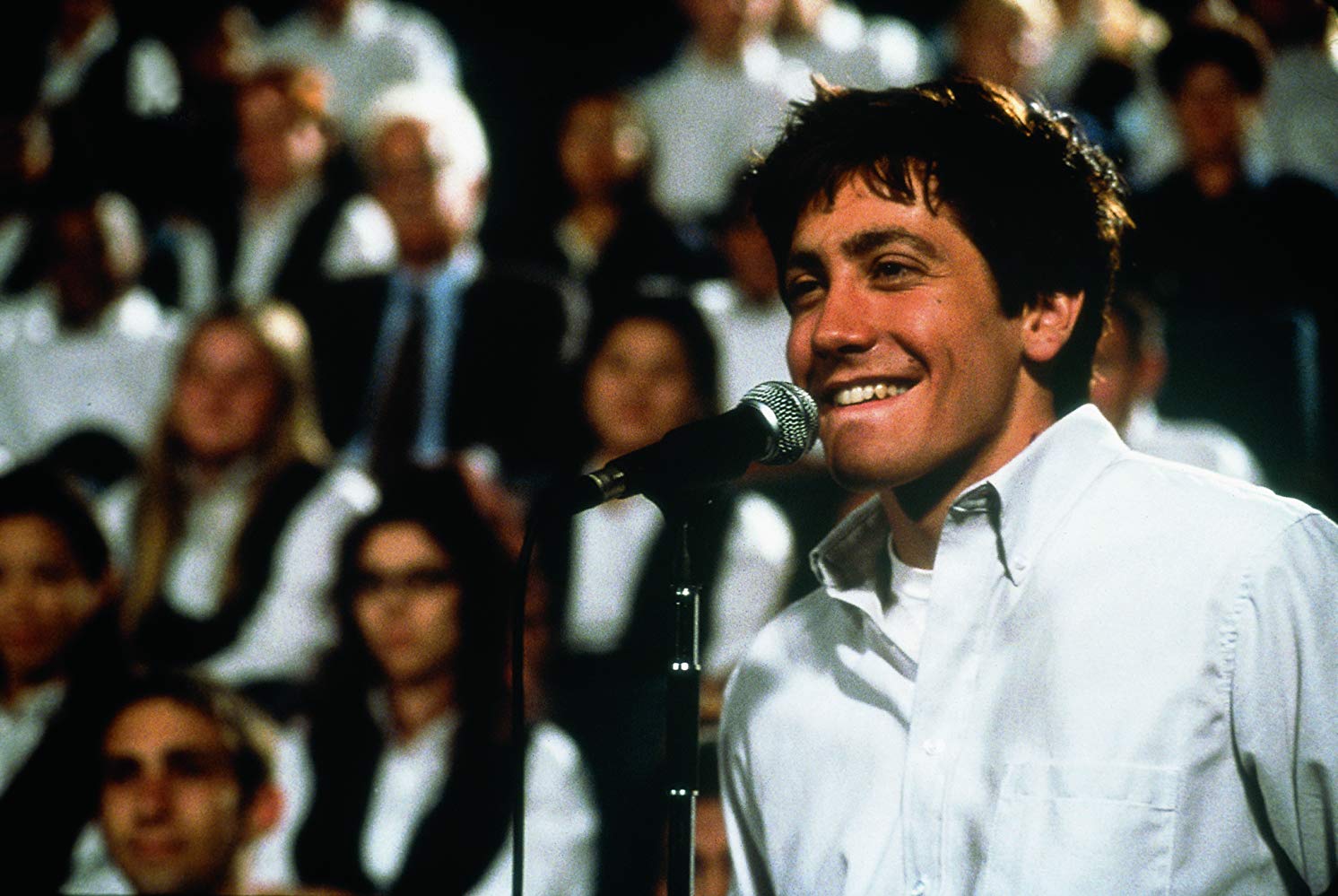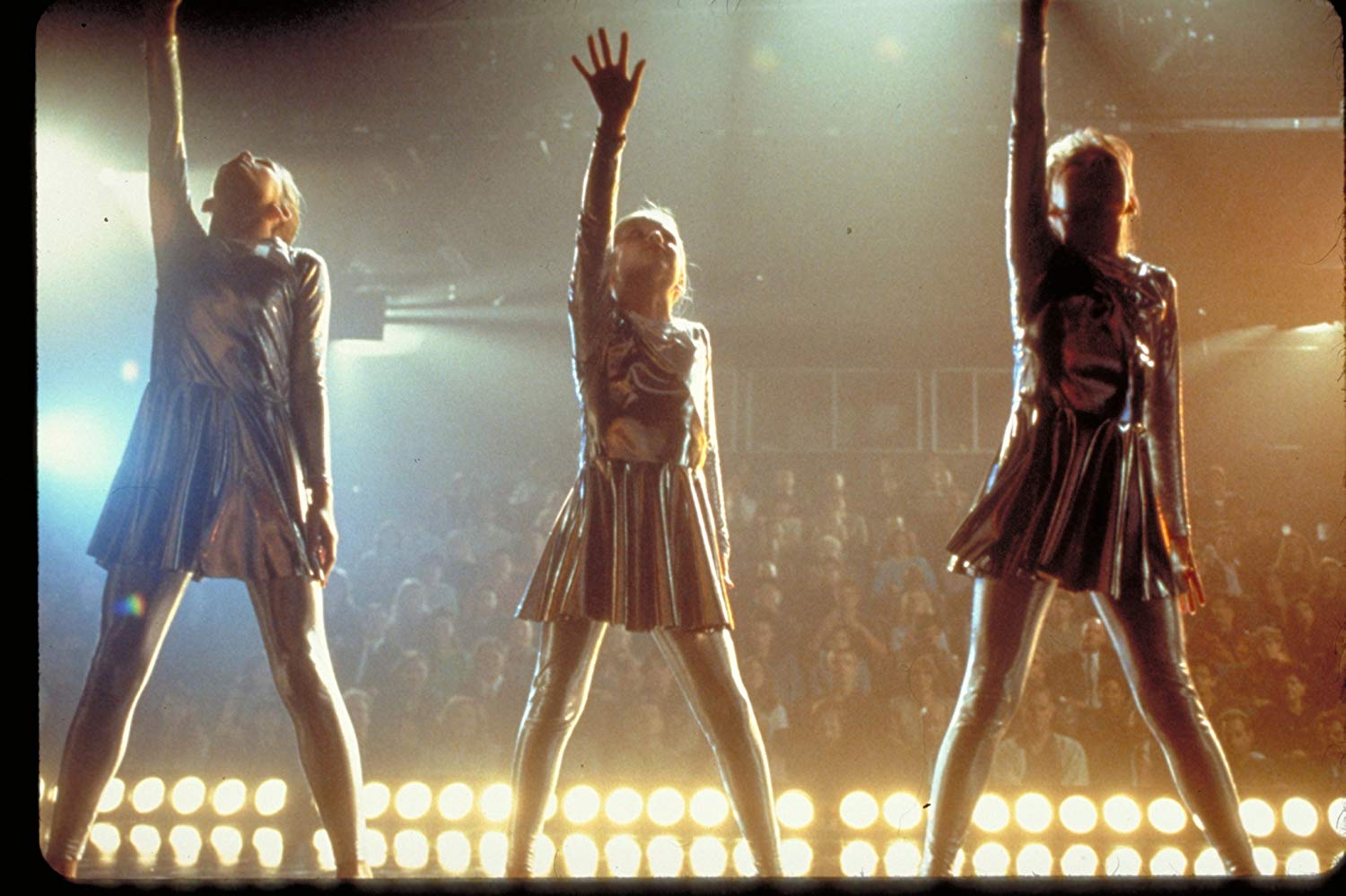28 days, 6 hours 42 minutes and 12 seconds – that’s how long a dead man in a bunny suit tells Donnie he’s got until the end of the world, and it’s also roughly how long Richard Kelly had to make the film that would define his career…
No one could doubt Richard Kelly’s commitment to Sparkle Motion, because while it’s easy to draw parallels between DonnieDarko‘s writer-director and its troubled hero, there’s clearly a side to Kelly that’s much more like Ms Farmer, the overbearing gym teacher who insists on getting every detail of her pre-teen dance squad’s routine exactly right, down to the last spirit finger.
Kelly was 23 years old when he wrote the screenplay that would become Donnie Darko. He had studied film at the University of Southern California, but while he had made a couple of shorts, he was intimidated by the prospect of writing something longer. It wasn’t until after he’d graduated, when he was working as a production assistant in a music video production house, that Donnie Darko started to take shape.
“I spent my entire life trying to think of the most compelling story for my first screenplay,” he says while talking to us about the film’s 4k restoration. “And this is what emerged.” Via a friend who also worked as a production assistant, Kelly managed to get his script onto the desk of an agent at Creative Artists Agency, which got him called into meetings with producers and agents. They were all impressed by his talent, and wanted to get him working on other scripts. Kelly wasn’t interested.
“A lot of people thought [Donnie Darko] was just a writing sample,” he says. “They thought it was unproduceable, and they thought I wasn’t ready to direct a film. But I stuck to my guns.” He kept shopping the script around until a guardian angel stepped in. Drew Barrymore (probably not wearing a bunny suit) and her Flower Films partner Nancy Juvonen read the script and loved it. With Barrymore on board in a minor role, things started to fall into place.
Casting was the next hurdle. Kelly originally wanted Jason Schwartzman in the lead after his star-making turn as Max Fischer in Rushmore a couple of years earlier, and he would have been an obvious fit for awkward Donnie. Unfortunately, a scheduling conflict meant that Schwartzman had to pull out at the last minute. “We had a shortlist of other actors,” Kelly remembers. “But when Jake [Gyllenhaal] walked into the room, I just had a gut instinct that he was the right actor for the role. I offered it to him on the spot.”
Kelly also cast Gyllenhaal’s real-life sister, Maggie, as Donnie’s sister Elizabeth. But there was one role that looked set to be trickier to cast: Jim Cunningham, who Kelly describes as “a demented self-help guru who has a very dark side.” Barrymore helped out again, introducing Kelly to Patrick Swayze. Despite his leading man reputation, he was up for the challenge. “He was in a position in his career where he was really willing to take some risks and do indie films,” says Kelly. “That was a really challenging role, and Patrick was willing to go there.”
The film was ultimately shot in 28 days for just $4.5 million – the
absolute minimum Kelly had calculated he needed to make it. It wasn’t easy. “There was a time when it was difficult for me to watch it, because I’d attached so many anxieties to the process of making it,” he recalls. “It was quite an ordeal to get it made. But there are a lot of fond memories too, and hindsight has a way of healing those painful experiences.”
Hindsight – and critical adulation – might well have soothed the pain of production, but making the film was only half the battle. Though it’s a beloved cult classic now, it’s not hard to imagine an alternate timeline where it flopped instead. “It was not a success at Sundance,” says Kelly. “No one wanted to distribute it. It took six months to get a distribution deal, and even then the distributor who bought it was not enthusiastic about the film at all. We had to beg them to put it in theatres.”
Donnie Darko found another champion in Christopher Nolan. His support got the film its theatrical release, but it still faltered. In October 2001, it was difficult to work out how to market a film that revolved around a plane crash – and post-9/11 audiences weren’t feeling much like going to the cinema anyway.
Slowly the film started to find its audience. Critics began to fall under its spell, and by the time the DVD was released, its combination of Eighties coming-of-age story and twisty science fiction made it a must-see. “That gives me faith in audiences that are capable of discovery, and capable of being resilient” says Kelly.
But he himself has never been entirely happy with it. “It’s a painstaking process, making a film,” he says. “I definitely am very obsessive about every detail. That’s part of being an artist: your work is never really finished, it’s abandoned.” A couple of years after its initial release, Kelly went back and cut another version. Released in 2003, the Director’s Cut adds some extra scenes, and also splices in extracts from the film’s fictional Philosophy Of Time Travel book.
Yet Kelly still doesn’t feel finished. “I’m not satisfied with either version,” he admits. “There are still things I wish I could do, but I wanted there to be two versions. You can have an extended remix of a song and it doesn’t replace the original, so people can watch whichever version they want. I’m grateful that it’s endured and that we got to restore it, because now the image quality is where it should be. Blu-ray and DVD were never right.”
Though there are many great things about Donnie Darko – the performances, the soundtrack, the care lavished on every frame – the most likely reason it has endured is because its challenging plot defines definition. As a perfectionist, does it bother Kelly that people are still debating what his film really means? Surprisingly, he says not. “This is a story that is open to many interpretations, and I welcome all of those interpretations,” he says. “There’s no right answer. There are plenty of wrong answers, but I’m always happy for anyone to bring their own interpretation to the film.
“That’s what art should do: be inclusive to everyone.”
Donnie Darko Anniversary 4K Restoration is available to buy on Dual Format now, distributed by Arrow Video.


